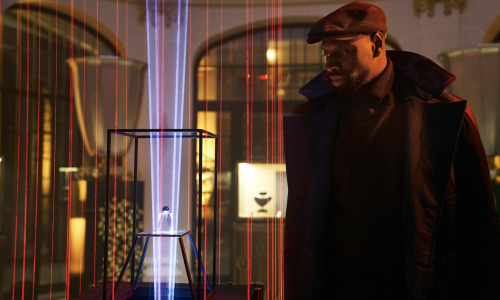- Best Movies
- Lupin

-
Director:
George Kay
-
Release date:
January 8, 2021 (Part 1)
-
Distributed by:
Netflix
Features Review
Lupin Review: The Masterful Art of Deception Meets Contemporary Vigilantism
As the lines blur between heroism and villainy, Netflix's 'Lupin' emerges as a sophisticated blend of charm, wits, and social commentary encased in a tale of revenge and justice. With Omar Sy's magnetic performance as Assane Diop – inspired by Maurice Leblanc's Arsène Lupin – the series reintroduces the gentleman thief archetype in a modern light that has captivated audiences globally. Since its debut, 'Lupin' has been stealing the spotlight, garnering praise for its adept storytelling and cultural resonance. The series presents a riveting narrative that springs from the tribulations of Diop's father, unjustly framed by a wealthy employer, pulling viewers into a layered journey of subterfuge and cunning finesse against the opulent backdrop of Parisian high society.
A Cunning Gentleman Thief in Modern Paris
The cinematic scene, ever-evolving, occasionally gifts its audiences with films that attempt to blend nostalgia with contemporary flair. Such is the goal of the “Lupin” movie, hoping to capture the essence of Maurice Leblanc's enduring character, Arsène Lupin, the genteel thief. This iteration of the Lupin tale propels the charismatic burglar into today's world, striving to retain the original character’s cleverness and charm while providing modern viewers a recognizable Parisian backdrop rife with technology and contemporary issues.
The film echoes the intrigue of classic heist capers, presenting a suave mastermind with a moral compass that's aligned with the audience's sense of justice. It seeks to blend the sophistication of old-world heist plots with the sleek crispness of modern cinema. Viewers are invited to watch the exploits of the main character as he maneuvers through deceptions, close calls, and elaborate schemes — all the while staying one step ahead of the law. As homage to the character's history, the movie draws inspiration from the vast collection of Lupin's adventures, repackaging them for fans and newcomers alike.
Weaving a Web of Intrigue with Modern Threads and Loose Ends
'Lupin's most notable strengths lie in its pulsating narrative and Sy's masterful embodiment of the charismatic lead. However, even the most thrilling of heist stories aren't devoid of flaws. Across its captivating seasons, the series occasionally stumbles in its dedication to technological authenticity. At times, the depicted tech wizardry strays from believability, bordering on a convenient plot-propelling device rather than a plausible element of Diop's arsenal.
Additionally, while the show thrives on the premise of disguises and identity swaps, there are instances where the execution feels forced. A blond wig meant to conceal Diop's identity leads to more disbelief than the narrative might afford. Despite the occasional dip into the incredulous, these moments are often saved by a sly wink towards the satirical – a nod to the audience that sometimes, not all is meant to be taken seriously.
'Lupin' does not shy away from the bloodier, more violent aspects that its previous seasons might have skirted around. The grittier approach extends the show's range, but not without risk, as it brushes up against the edge of its established tone. Yet, 'Lupin' weaves these threads into its larger tapestry, underscoring Assane Diop's evolution and the personal demons he confronts, artfully balancing his Robin Hood-esque escapades with raw human drama.
A Capers Chronicle's Arresting Appeal and Momentary Missteps
The viewing public's reverence for 'Lupin' is a testament to the show’s captivating allure. Audiences have been overwhelmingly positive, lauding its intricate plotting and Omar Sy's star-making performance. The charm offensive that Diop orchestrates has viewers not only rooting for his victories but also reflecting on societal imbalances — a hallmark of engaging storytelling.
However, no narrative masterpiece is without critique, and for some viewers, 'Lupin's dalliance with implausible scenarios, particularly regarding digital subterfuge, raises eyebrows. Nonetheless, these minor gripes are seldom enough to detract from the overall enthrallment. The third season successfully elongates Assane Diop's crusade beyond mere personal vendetta to a broader analysis of societal fractures.
In decoding the 'Lupin' phenomenon, it's apparent that its weak spots are part of its charm. They are moments of reprieve that accentuate the show's bravado and its ambition to provide not just a heist narrative but also a mirror to our own reality through the lens of a most gentlemanly thief. As the credits roll, one can't help but feel a part of Diop's world – outsmarting the system, charming friends and foes alike, and questioning the rules of the game.
































